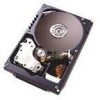IBM IC35L036UWDY10 Hard Drive Specifications - Page 226
Reset, 16.1 Reset Sources, 16.2 Power On Reset
 |
UPC - 000004119524
View all IBM IC35L036UWDY10 manuals
Add to My Manuals
Save this manual to your list of manuals |
Page 226 highlights
11.16 Reset The Reset condition is used to clear all SCSI devices from the bus. This condition takes precedence over all other phases and conditions. After a reset condition is detected and the reset actions are completed, the drive returns to a 'SCSI bus enabled' state that allows the drive to accept SCSI commands. This device uses the Hard reset option as defined in the SCSI-3 Parallel Interface Standard. 11.16.1 Reset Sources There are four sources of resets detected by the drive: Reset Name Reset Source Power-On Reset This is the signal generated by the hardware at initial power-on Self-Initiated reset This is a software-generated reset that occurs when a internal logic error is detected by the microcode. SCSI Bus Reset This is a reset generated when the SCSI bus control line RST goes active. TARGET RESET Message This is the reset generated by the TARGET RESET Message. 11.16.2 Power On Reset At Power On Reset (POR) the following bring-up operation is taken: 1. Validation of ROM and EEPROM 2. RAM test for internal RAM 3. Test and initialize HDC registers 4. RAM test for sector buffer 5. Start spindle motor (if Auto Spin up is enabled) 6. Calibration of actuator 7. Read/Write test for all heads 8. Validation of RAM code and data table (RDM, Log, Mode Page) from the reserved area If Auto Spin up is disabled, steps 5 - 8 will be executed when the first START STOP UNIT command with Start bit. Faults detected before successful completion of the HDC section could prevent the drive from responding to a selection. Faults detected after the successful completion of the HDC section will be reported as CHECK CONDITION status to the initiator on the first command issued after a fault is detected except for the INQUIRY, REPORT LUNS and REQUEST SENSE command. The INQUIRY, REPORT LUNS and REQUEST SENSE command will always be responded with a GOOD status. Detecting a fault during POR will not terminate execution of the bring-up operation. Ultrastar 146Z10 hard disk drive specifications 210















